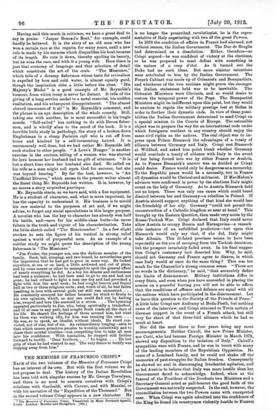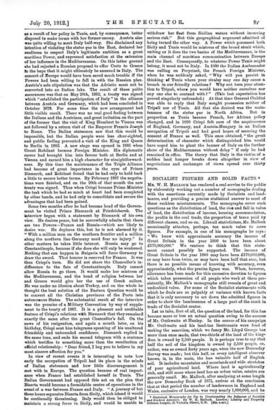THE MEMOIRS OF FRANCESCO CRISPL* EACH of the two volumes
of the Memoirs of Francesco Crispi has an interest of its own. But with the first volume we do not propose to deal The history of the Italian Revolution has been told with singular success by Mr. George Trevelyan, and there is no need to concern ourselves with Crispi's relations with Garibaldi, with Cavour, and with Mazzini, or with his narrative of the "Expedition of the Thousand." But in the second volume Crispi appears in a new character. He
• • The Memoirs of Francesco Crispi. Translated by Mary Prichard-Agnelli. 2 vols. London Hodder and Stoughton. [lea]
is no longer the proscribed, revolutionist, be is the repre- sentative of Italy negotiating with two of the great Powers.
In 1878 the condition of affairs -in France had alarmed, not without reason, the Italian Government. The Due de Broglie had determined on a dissolution. Either, therefore—so Crispi argued—he was confident of victory at the elections, or he was prepared to meet defeat with something in the nature of a coup d'etat. As it turned out the Duke had no such ideas. But more sinister intentions were attributed to him by the Italian Government. The French Cabinet was made up of Orleanists and Bonapartists, and whichever of the two sections might prove the stronger the Italian statesman held war to be inevitable. The Orleanist Ministers were Clericals, and so would desire to restore the temporal power of the Pope. The Bonapartist Ministers might be indifferent upon this point, but they would be anxious to regain the military prestige lost at Sedan in order to further their dynastic ends. In view of these possi- bilities the Italian Government determined to send Crispi on a special mission to the Courts of Europe. The ostensible object was to prepare the way for an international code under which foreigners resident in any country should enjoy the same civil rights as the natives. The real object was to im- press upon Prince Bismarck the advantages of a treaty of alliance between Germany and Italy. Crispi met Bismarck at Wildbad, and asked him point blank whether Germany would conclude a treaty of alliance with Italy in the event of her being forced into war by either France or Austria.. As to France Bismarck's answer was as decided as Crispi could desire. France would only be dangerous as a monarchy. To the Republic peace would be a necessity, but in France all dynasties would be Clerical and militarist. If MacMahon's advisers were confirmed in power by the elections Italy might count on the help of Germany. As to Austria Bismarck held out no hopes. There was only one cause which could breed discord between her and Germany—a rebellion in Poland. If Austria should support anything of that kind she would lose the friendship of her ally. Germany "could not permit the reconstruction of a Catholic kingdom so near at hand." This brought up the Eastern Question, then made very acute by th0 Russo-Turkish War. Crispi declared that Italy could never allow Austria to occupy Bosnia and Herzegovina—a remark- able instance of an unfulfilled prediction—but upon this Bismarck would only say that, if she did, Italy might take Albania. This ill-fated province seems to have been repe:itedly on the eve of escaping from the Turkish dominion, but the prospect invariably faded away. in his final sugges- tion Crispi's customary tact deserted him. Why, he said, should not Germany and France agree to disarm, in which case Italy would at once do the same thing ? This was too much for the Chancellor's strong common sense. "There are no words in the dictionary," he said, "that accurately define the limits of disarmament. Military institutions differ in every State, and even when you have succeeded in placing the armies on a peaceful footing you will not be able to affirm that the conditions of offence and defence are equal with all the nations which have participated in the disarmament. Let us leave this question to the Society of the Friends of Peace." A little later Crispi saw Andrassy at Buda-Pesth, but nothing came of the interview, and Crispi returned to Turin certain of German support in the event of a French attack, but still very far short of that three-fold alliance which he had so much at heart.
Nor did the next three or four years bring any more encouragements. Neither Cairoli, the new Prime Minister, nor Corti, who had become Foreign Minister in March 1878k showed any disposition to the isolation of Italy." Cairoli's sympathies were with France, and he was in touch with many of the leading members of the Republican Opposition. He came of a Lombard family, and be could not shake off the memories of past struggles for Italian freedom. Consequently, he showed no zeal in discouraging Irredentist agitation, and so led Austria to believe that Italy was more hostile than her Government dared to acknowledge. Indeed, when at the funeral of the President of the Irredenta two Ministers and a Secretary-General acted as pall-bearers the good faith of the Government was naturally suspected. In the end, however, the reconciliation between the two Powers came with unexpected ease. When Crispi was again admitted into the Confidence of the King he found his countrymen violently hostile to France; as a result of her policy in Tunis, and, by consequence, better disposed to make terms with her former enemy. Austria also was quite willing to meet Italy half-way. She disclaimed any intention of violating the status quo in the East, declared her readiness to respect Italy's legitimate ambition as a great maritime Power, and expressed satisfaction at the entension of her influence in the Mediterranean. On this latter ground she had rejected a Russian proposal to offer Crete to Greece Pa the hope that it might ultimately be annexed to Italy. The concert of Europe would have been saved much trouble if the Powers had been willing to fall in with the Russian plan. Austria's sole stipulation was that the Adriatic must not be converted into an Italian lake. The result of these polite assurances was that on May 20th, 1882, a treaty was signed which "established the participation of Italy" in the alliance between Austria and Germany, which had been concluded in October 1879. For some time the new arrangement had little visible result. There was no real good feeling between the Italians and the Austrians, and great irritation on the part of the former that the visit of King Humbert to Vienna was not followed by a return visit of the Emperor Francis Joseph to Rome. The Italian statesmen saw that this would be impossible, but the Italian people were less clear-sighted, and public feeling prevented a visit of the King and Queen to Berlin in 1883. A new stage was opened in 1885 when Count Robilant became Foreign Minister. His diplomatic career had brought him into favour both at Berlin and at Vienna and earned him a high character for straightforward- ness. By this time the maintenance of the Triple Alliance had become of great importance in the eyes of Prince Bismarck, and Robilant found that he had only to hold back a little to secure better terms. By February 1887 the negotia- tions were finished, and on the 20th of that month the new treaty was signed. Thus when Crispi became Prime Minister the task which he had so much at heart had been completed by other hands, and he had only to consolidate and secure the advantages that had been gained.
Some two months after he had become head of the Govern- ment he visited Prince Bismarck at Friedrich:3ml]. The interview began with a statement by Bismarck of his own view. He desires peace, but he sorrowfully admits that there are two Powers—France and Russia—which are likely to desire war. He deplores this, but he is not alarmed by it. "With a million men on the southern frontier and a million along the northern line Germany need fear no injury." In other matters he takes little interest. Russia may go to Constantinople, because if she does she will only be weakened. Nothing that can happen in Bulgaria will force Germany to draw the sword. That honour is reserved for France. It was then Crispi's turn. He did not share the Chancellor's in- difference to the fate of Constantinople. Italy cannot allow Russia to go there. It would make her mistress of the Mediterranean, and the bond of religion between her and Greece would give her the use of Greek sailors. He was under no illusion about Turkey, and on the whole he thought the best solution of the Eastern Question would be to convert all the Christian provinces of the Porte into autonomous States. The substantial result of the interview was the promise of a Military Convention by way of supple- ment to the treaty of 1887. It is a pleasant and creditable feature of Crispi's relations with Bismarck that they remained exactly the same after the great Chancellor's fall. On the news of his resignation, and again a month later, on his birthday, Crispi sent him telegrams speaking of his unaltered friendship and unbounded confidence. Bismarck replied in the same tone, and ends his second telegram with a sentence which testifies to something more than the recollection of official relationship : "Dear friend, I beg you to believe in my most sincere affection for you."
In view of recent events it is interesting to note how early the occupation of Tripoli had its place in the minds of Italian statesmen and how little discouragement it met with in Europe. The question became of real import- ance when France had established herself in Tunis. The Italian Government had opposed this act on the plea that Biserta would become a formidable centre of operations in the event of a war between France and Italy. "A journey of but three hours separates Biserta from Sicily, which island it would be continually threatening. Italy would then be obliged to maintain a strong force in Sicily, and would be unable to
withdraw her fleet from Sicilian waters without incurring serious risk." But this geographical argument admitted of being turned the other way. A Power which possessed both Sicily and Tunis would be mistress of the broad strait which, uniting as it does the two basins of the Mediterranean, is the main channel of maritime communication between Europe and the East. Consequently, to whatever Power Tunis might belong, it must not be Italy. In 1880 the Italian Ambassador was sailing on Freycinet, the French Foreign Minister, when he was suddenly asked, "Why will you persist in thinking of Tunis where your rivalay may one day cause a breach in our friendly relations ? Why not tarn your atten- tion to Tripoli, where you would have neither ourselves nor any one else to contend with ? " (This last expectation has proved singularly unfounded.) At that time General Gialdini was able to reply that Italy sought possession neither of Tripoli nor of Tunis. All that she desired was the main- tenance of the status quo in North Africa. But in proportion as Tunis became French, her African policy changed, and in 1890 Crispi felt sure of the acquiescence of England, Germany, and Austria-Hungary in an Italian occupation of Tripoli and had good hopes of securing the consent of France as well. This once obtained, "the great determination of character which distinguished him would have urged him to plant the banner of Italy on the further shore of the Mediterranean without delay" if only be had remained in office. The theory that Italy is the victim of a, sudden land hunger breaks down altogether in view of negotiations and exchanges of views spread over thirty years.







































 Previous page
Previous page